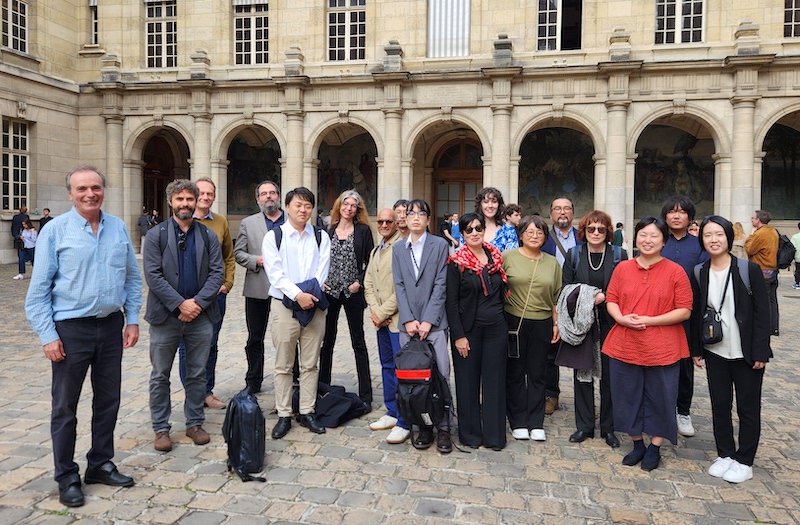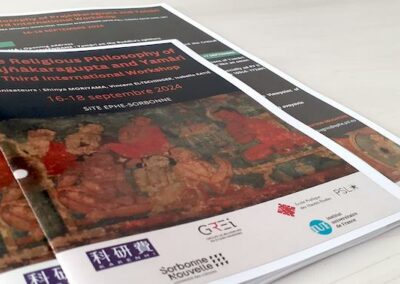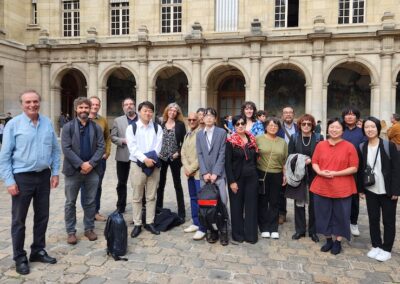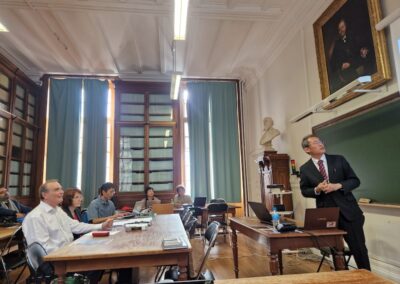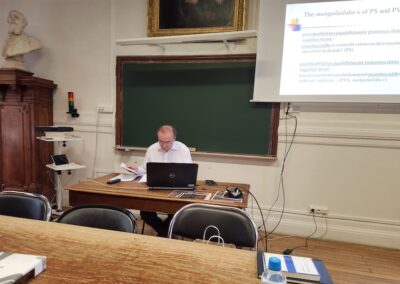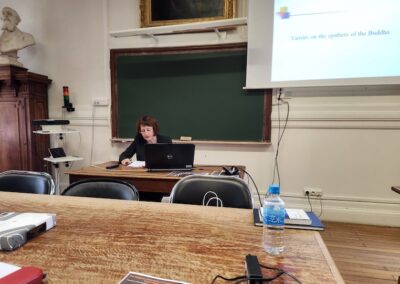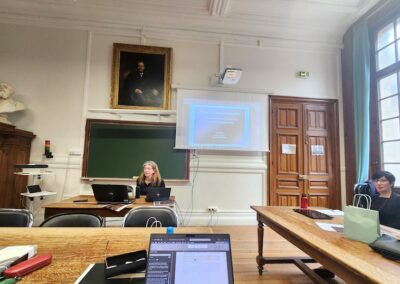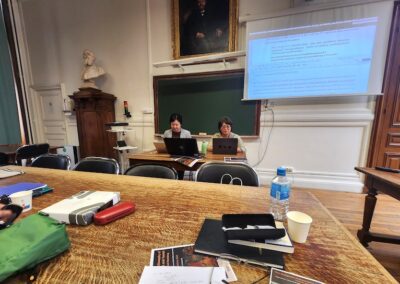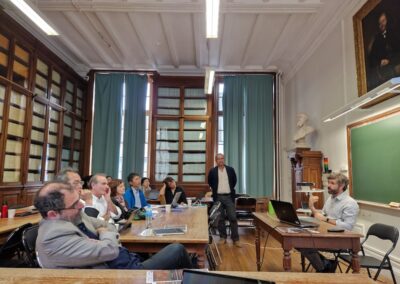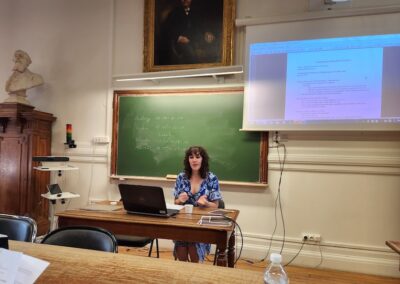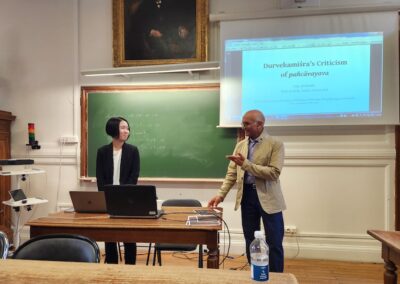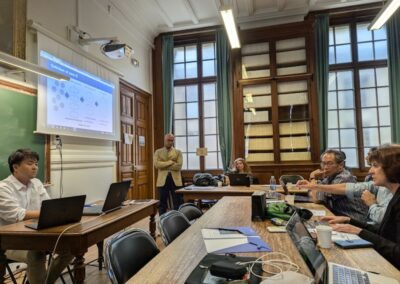The Religious Philosophy of Prajñākaragupta and Yamāri
Third International Workshop
16-18 septembre 2024
EPHE-Sorbonne, Paris 5ᵉ
Après Sapporo (2022) et Vienne (2023), Paris a accueilli, sous les auspices conjugués du GREI, de l’Institut universitaire de France (IUF) et de la Japan Society for the Promotion of Science (JSPS), le troisième worshop consacré à la philosophie religieuse de Prajñākaragupta et Yamāri. L’événement doit son existence à la découverte récente d’un manuscrit sanskrit du commentaire de Yamāri (XIe siècle) au Pramāṇavārttikālaṅkāra de Prajñākaragupta (actif autour de 800), lui-même l’un des commentateurs les plus innovants et influents du grand théoricien bouddhiste de la connaissance Dharmakīrti (vers 600). Co-organisé cette année par Shinya Moriyama (Shinshu University, Matsumoto), Vincent Eltschinger (EPHE-PSL) et Isabelle Ratié (Université Sorbonne Nouvelle Paris III, IUF), le workshop a donné l’occasion à une vingtaine de spécialistes de la philosophique bouddhique tardive de présenter leurs travaux et de faire le point sur l’avancée des éditions, des traductions et des études.
Fidèle à sa vocation initiale, il a également permis aux éditrices et éditeurs de partager leurs questions et problèmes (paléographie, exégèse, traduction, etc.). Ces dernières années, le workshop s’est imposé comme l’un des principaux événements scientifiques relatifs à la philosophie du courant logico-épistémologique bouddhique, assurant une continuité bienvenue entre les traditionnelles International Dharmakīrti Conferences (1981, 1989, 1997, 2005, 2014, 2022). En plus des interventions des meilleurs spécialistes de Yamāri et Prajñākaragupta (Eli Franco, Hiroko Matsuoka [Leipzig-Vienne], Shinya Moriyama ; Masahiro Inami n’a pu faire le voyage de Paris), plusieurs communications ont témoigné de la vitalité et du renouvellement des études de logique et d’épistémologie bouddhique : édition critique de la Santānāntarasiddhi de Dharmakīrti (Vincent Eltschinger et Isabelle Ratié), thèmes de l’inférence (Patrick McAllister, Vienne ; Eiko Kodama, Tokyo), du temps (Audrey Guilbault, Chicago), de la noétique et de la sémantique (Kazuki Kimura, Tokyo), du tout et de ses parties (Akito Yokoyama, Kyushu), etc.
Cette troisième édition du workshop a donné la parole à de jeunes chercheuses et chercheurs japonais, renforcé les liens entre spécialistes japonais, européens et américains (Parimal Patil, Harvard), et permis à Paris de s’affirmer comme l’un des principaux centres dans l’étude de la philosophie indienne. Les participants ont unanimement loué l’accueil qui leur a été réservé, et applaudi Fabienne Bagnis, gestionnaire du GREI, pour la qualité de son travail et sa disponibilité.
Programme détaillé et résumés des communications
Programme détaillé
September 16, Monday
- 10-10:15 Shinya MORIYAMA: Opening address
- 10:15-11:15 Eli FRANCO & Karin PREISENDANZ: Yamāri on the Buddha’s epithets
- 11:15-11:30 Break
- 11:30-12:30 Hiroko MATSUOKA: Prequels to Yamāri’s ādivākya Theory
- 14:00-15:30 Vincent ELTSCHINGER & Isabelle RATIÉ: On the Philosophical Reception and the Critical Edition of Dharmakīrti’s Santānāntarasiddhi
- 15:30-15:45 Break
- 15:45-17:00 Mai MIYO: Reading PVA on nirodhasatya
September 17, Tuesday
- 10:00-11:30 Eli FRANCO & Hiroko MATSUOKA: Difficult portions of Yamāri
- 11:30-11:45 Break
- 11:45-12:45 Patrick McALLISTER: How is inference like an omen ?
- 14:00-17:00 Shinya MORIYAMA: Reading PVA on duḥkhasatya (PVA ad PV Il 162-175, especially ad PV Il 164-166 & 169cd- 172ab)
September 18, Wednesday
- 10:00-11:00 Audrey GUIBAULT: Prajñākaragupta on temporal experience
- 11:00-11:15 Break
- 11:15-12:00 Eiko KODAMA: Durvekamiśra’s Criticism of pañcāvayava
- 12:00-12:45 Kazuki KIMURA: Prajñākaragupta’s Position in Apoha Theory: From the Viewpoint of « Unitary Judgement »
- 14:00-14:45 Akito YOKOYAMA: Prajñākaragupta’s Critique of the Weight of avayava and avayavin
- 14:45-15:30 Shinya MORIYAMA: Closing discussion
Eli Franco (University of Vienna) & Karin Preisendanz (University of Vienna): Yamāri on the epithets of the Buddha
The five epithets of the Buddha that appear in the maṅgalaśloka of the Pramāṇasamuccaya, especially the most famous first one, pramāṇabhūta, were at the center of attention in studies of the Buddhist epistemological traditions for quite some time. Prominent scholars like Tilmann Vetter, Ernst Steinkellner and David Seyfort Ruegg penned highly specialized studies about their meaning and role in Dignāga’s work, and their later interpretation by Dharmakīrti and his followers. In more recent years, interest in this topic seems to have waned and the last important study of it was by the late Helmut Krasser, in a paper on the term pramāṇabhūta published in 2001,[1] which was prompted by the Sanskrit materials newly available through Jinendrabuddhi’s Pramāṇasamuccayaṭīkā.
However, the progressing work on the critical edition of the Pramāṇavārttikālaṅkāranibandha has brought to light Yamāri’s extensive discussion of the first out of two maṅgalaślokas of the Pramāṇavārttikālaṅkāra, and because of the striking similarity of this verse to that of the maṅgalaśloka of the Pramāṇasamuccaya, we have gained access to some new ideas about the five epithets mentioned by Dignāga. In our paper, we aim to present and discuss these new ideas.
[1] « On Dharmakīrtiʼs understanding of pramāṇabhūta and his definition of pramāṇa. » Wiener Zeitschrift für die Kunde Südasiens 45 (2001) 173–199.
Hiroko Matsuoka (University of Vienna): Prequels to Yamāri’s ādivākya Theory - The Impact of Kumārila and Dharmakīrti on the Exegetical Debates on the Initial Statement (ādivākya) within the Buddhist Logico-Epistemological Tradition
In the Pramāṇa-vārttikālaṅkāra-nibandha (PVAN), before beginning his commentary on the Pramāṇavārttikālaṅkāra, Yamāri (c. 11ᵗʰ cent.) dedicates a substantial section—ten folios long—to a general introduction that presents his unique theories on three key aspects: the initial statement (ādivākya), the order of the chapters of the Pramāṇavārttika (PV), and the scope of the Pramāṇavārttika. The first aspect was partially covered in my earlier work (Matsuoka 2024; forthcoming), the second has been extensively examined by Junjie Chu (2023) and is also the focus of a forthcoming paper coauthored by Eli Franco and Karin Preisendanz, while the third was analyzed by Franco (2018). Within the “Yamāri Project,” in addition to critically editing the Sanskrit text of the PVAN with Franco, my research aims to clarify the first aspect of Yamāri’s ādivākya theory and to situate his position within the intellectual history of commentarial literature on the ādivākya in the Buddhist logico-epistemological tradition. This includes exploring its theoretical and historical contexts. My focus in this talk is on Kumārila Bhaṭṭa’s (c. 7ᵗʰ cent.) commentary on the ādivākya of Jaimini’s Mīmāṃsāsūtra (Ślokavārttika, Pratijñāsūtra, vv. 11–25) and Dharmakīrti’s (c. 7ᵗʰ cent.) thesis on the criteria for evaluating a treatise (PV 1.214 with its Svavṛtti). These works laid the groundwork for later debates on the ādivākya among commentators from the eighth to the eleventh centuries, culminating in the views of Yamāri.
Vincent Eltschinger (École Pratique des Hautes Études)/Isabelle Ratié (Sorbonne Nouvelle University/Institut Universitaire de France): On the Critical Edition and Philosophical Reception of Dharmakīrti’s Santānāntarasiddhi
After briefly presenting the sources used for the forthcoming critical edition of the Sanskrit text of Dharmakīrti’s Santānāntarasiddhi, we will discuss the philosophical reception of the work while focusing on the issue of the invariable concomitance (vyāpti) in the inference of other minds.
Mai Shida-Miyo (Komazawa University): Reading PVA on nirodhasatya (PVA ad PV II 202)
In this session, we will read Prajñākaragupta’s commentary (PVA) ad Dharmakīrti’s Pramāṇavārttika (PV) II 202, mainly consulting with Yamāri’s subcommentary (PVAN). Dharmakīrti discusses nirodhasatya in verses 190 to 216 in the Pramāṇasiddhi chapter. Prajñākaragupta considers them to be explanations of the four aspects (ākāra) of nirodhasatya in turn, and the verse 202 is assigned to the third one, praṇītataḥ. The main topic here is the criticism of ātman as one and the same basis of bondage and liberation, and we can find some Prajñākaragupta’s own discussion on this.
Eli Franco (University of Vienna) and Hiroko Matsuoka (University of Vienna): Selected Difficult Portions in Yamāri’s Pramāṇavārttikālaṅkāranibandha (Discussion)
We will explore uncertain passages in our provisional Sanskrit edition of Yamāri’s Pramāṇavārttikālaṅkāranibandha. Through collaborative efforts, we aim to clarify these passages, enhancing both the discussion and our comprehension of the text.
Patrick McAllister (Austrian Academy of Sciences): How is inference like an omen?
Prajñākaragupta is renowned for his theory that causes exist not only in the past, but also in the future. He develops this theory in his commentary on PV 2.4d–5a. There, he aims to establish when an awareness event qualifies as a source of knowledge. The theory itself is understood quite well at this point. However, the full implications of this theory for Prajñākaragupta’s system have yet to be explored. This contribution examines the significance of this theory for Prajñākaragupta’s proof that the only two everyday sources of knowledge are inference and perception.
Shinya Moriyama (Shinshu University) & Hiroko Matsuoka (University of Vienna): A Reading of the Pramāṇavārttikālaṅkāra ad Pramāṇavārttika II 162-173ab: Prajñākaragupta’s Critique of the Cārvāka View on the Mind-Body Relationship
In the latter part of the Pramanasiddhi chapter, the second chapter of Dharmakīrti’s Pramāṇavārttika, starting from verse 146a2 (tāyo vā catuḥsatyaprakāśanam), the Buddha’s epithet ‘protector’ (tāyin) is discussed by focusing on his ‘protection’ (tāya) by clarifying the four nobles’ truths. In this section, the four truths, which is a traditional doctrine of Buddhism, is demonstrated through Dharmakīrti’s philosophical reasoning. It is a significant section for considering the intersection of philosophy and religion in Buddhism, but previous studies on Buddhist epistemology have mainly focused on issues such as the truth/validity of cognition, theories of causality, the non-conceptuality of perception, and the foundations of necessary relationships in inference and so on. As a result, this section has remained in the shadow of those studies and has not yet received sufficient attention.
Although there have been excellent studies, such as the German translation by Tilmann Vetter (1990), an overview of the content by Eli Franco (2017), and a detailed examination of the section on the truth of cessation by Cristina Pecchia (2015), in particular, Prajñākaragupta’s commentary, which adds many original philosophical considerations, requires further investigation on its own. Since the fall of 2020, I have been working on the critical edition and Japanese translation of the Pramāṇavārttikālaṅkāra’s section on the truth of suffering, through various platforms such as Leipzig University (online, 2020), Hokkaido University (September 2022), the University of Vienna (September 2023), and the Prajñākaragupta Research Group. I am now nearing completion. In this session, based on the results achieved so far, I would like to introduce Prajñākaragupta’s discussion on Pramāṇavārttika II 162-173ab (mainly on vv. 164-166 and 168-172ab), including some difficult passages, and conduct a reading along with the Yamāri’s commentary prepared by Hiroko Matsuoka.
Audrey Guilbault (University of Chicago): Prajñākaragupta on Time
At Pramāṇavārttikālaṅkāra 111-116—amidst a discussion, in the Pramāṇasiddhipariccheda, of the Buddha’s being a teacher (śāstṛ)—Prajñākaragupta departs from Dharmakīrti’s root verses and embarks on a digression about the reality of time. What he says in this section seems to cover new philosophical territory; that the topic of time is then picked up again twice in the Pararthānumānapariccheda indicates that the topic is of some importance to Prajñākaragupta. In this first passage about time, Prajñākara denies that time is real, and I will devote much of my discussion to unpacking what exactly he might mean by this and what arguments he offers in defense of this claim. Much of Prajñākara’s defense of this claim proceeds with reference to the ability of yogins to cognize past and future objects, and sheds new light on what Prajñākara thinks about yogic cognition or perception (yogijñāna, yogipratyakṣa) in general. I will also discuss the relationship between what Prajñākara says about time and the view about perception, inference, and the epistemic value of ‘vivid presentation’ (sākṣātkāraṇa) that he offers immediately prior.
Eiko Kodama (Taisho University): Durvekamiśra’s Criticism of pañcāvayava
Dharmakīrti renovated the form of reasoning in Indian logic and developed his own reasoning formula, which consisted of two members, vyāpti and pakṣadharmatā. He eliminated all members of the formula except those that cause the logical reason with three characteristics (trirūpaliṅga) to be understood; he allowed only the statement of the minimum elements required for the listener’s inference.
Among his followers, Durvekamiśra, citing several works of the Naiyāyika, disputes that the reasoning formula consists of five members, especially the necessity of a thesis (pratijñā). The Dharmottarapradīpa ad 3.34, discussed in this presentation, refers to missing works, and previous studies have pointed out their value as materials for the study of the Naiyāyika. Unfortunately, because of the blurred manuscript images, the content of the discussion has not yet been fully clarified. Based on manuscript studies, this presentation will summarize Durvekamiśra’s critique of the five-membered reasoning formula (pañcāvayava), using the most challenging sections of the manuscript as examples for comparison with the relevant discussions in the Vyomavatī.
Kazuki Kimura (Tokyo University): Prajñākaragupta's Position in Apoha Theory: From the Viewpoint of ”Unitary Judgement”
The concept of « unitary judgment » (ekapratyavamarśa) is central to Dharmakīrti’s Apoha theory. Regarding the interpretation of Pramāṇavārttika I 109, Śākyabuddhi and Karṇakagomin offer contrasting views. Śākyabuddhi argues that unitary judgment, understood as “same result,” serves as the criterion for determining “identity of the cause,” or perception. In contrast, Karṇakagomin asserts that the awakening of latent impressions alone is sufficient for unitary judgment, so that identical result as a criterion is superfluous.
This presentation explores Prajñākaragupta’s interpretation of the Apoha theory within this framework, after reviewing the interpretations of other commentators including Devendrabuddhi, Ravigupta, Manorathanandin, and Śaṅkaranandana. Dharmottara further develops Śākyabuddhi’s view, focusing on the identity of unitary judgment, while Devendrabuddhi and Ravigupta do not address this aspect. Śaṅkaranandana and Manorathanandin maintain Dharmakīrti’s original view that “the cause is identified by the identity of the result.” Prajñākaragupta argues that if unitary judgment can be explained by latent impressions alone, then the necessity of commonality (sāmānya) is negated, aligning with Karṇakagomin’s interpretation.
Akito Yokoyama: Prajñākaragupta’s Critique of the Weight of avayava and avayavin
Nyāya-Vaiśeṣika scholars believe that the whole (avayavin) is a newly created substance (dravya) from its parts (avayava) and is distinct from a mere multitude of them. For example, according to Nyāya-Vaiśeṣika, cloth is a single substance as a whole, distinct from its parts, the threads. On the other hand, Buddhists do not recognize the whole as an entity. Buddhists criticize Nyāya-Vaiśeṣika’s theory of whole from various perspectives, such as the color of the whole, the unity of the whole, the relationship between the whole and its parts, etc., one of which focuses on the weight (gurutva) of the whole. There have been a few previous studies that focus on the weight of the whole, analyzing the arguments of Buddhists such as Vasubandhu, Dignāga and Dharmakīrti and Nyāya-Vaiśeṣika scholars such as Uddyotakara, Vācaspatimiśra, Śrīdhara, Udayana, and others. This presentation analyzes the arguments in Prajñākaragupta’s Pramāṇavārttikālaṅkāra, which have not been addressed in these earlier studies, and elucidates one aspect of Buddhist criticism of the part-whole theory.

